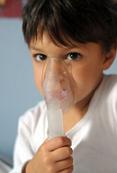Advertisment
Acetaminophen does not worsen asthma in young children

by Bruce Sylvester: Treatment of pain and fever with acetaminophen (Tylenol, etc.) does not exacerbate asthma in young children, researchers reported on August 18 NEJM/New England Journal of Medicine.
“We found no matter how you slice it, there was absolutely no difference between Tylenol and Motrin,” said investigator and author Wanda Phipatanakul, MD, MS, of Boston Children’s Hospital’s Division of Allergy and Immunology in Boston, Massachusetts. “Our findings should alleviate the concerns for safety that were based on observational data.”
As background, the authors noted that The Acetaminophen Versus Ibuprofen in Children with Asthma (AVICA) trial, is the only blinded, randomized, controlled trial to date in which acetaminophen is compared prospectively and head-to-head with ibuprofen (Motrin, etc.) in young children with asthma.
The investigators enrolled 300 children ages 1 to 5 years old with mild persistent asthma. They were randomized to use either acetaminophen or ibuprofen for pain and fever over a 48-week period.
All subjects received the same asthma control therapies, daily inhaled glucocorticoids, inhaled glucocorticoids as needed and daily oral leukotriene receptor antagonist.
Medication adherence was closely monitored.
Two hundred and twenty-six subjects completed the study.
Subjects in both groups used similar amounts of the medications for pain and/or fever (median, 5.5 doses).
After 48 weeks, they investigators reported no statistically significant differences in asthma exacerbations between groups. Asthma exacerbations per child averaged 0.81 in the acetaminophen group versus 0.87 in the ibuprofen group.
At least one asthma exacerbation happened in 49 percent of the acetaminophen group versus 47 percent of the ibuprofen group.
At least two episodes occurred in 21 percent of the acetaminophen group versus 24 percent of the ibuprofen group.
Percentage of days with full asthma control were almost the same, 85.8 in the acetaminophen group versus 86.8 percent in the ibuprofen group.
Use of “rescue” medication (albuterol) per week was essentially the same, at 2.8 puffs in the acetaminophen group versus 3.0 puffs in ibuprofen group.
Unplanned healthcare visits for asthma were the same, averaging 0.75 per child in the acetaminophen group versus 0.76 per child in the ibuprofen group.
The researchers noted that prior studies linking acetaminophen with increased asthma symptoms were not randomized and could not exclude the possibility that asthma exacerbations were caused by the respiratory infections.
“The toddler age is a wheezy age when kids are developing asthma, but they also get a lot of fevers and colds,” says Phipatanakul. “Without a randomized design, it’s hard to tease out the effects of medications.”
The authors noted that their findings might not apply to other age groups or children with more severe asthma.





